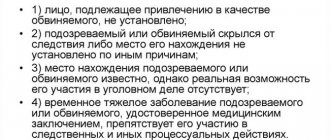How to appeal a refusal to initiate a criminal case?
This memo will teach you how to protect your rights if you become a victim of a crime, and law enforcement officials do not recognize you as a victim and refuse to initiate criminal proceedings.
You will need these instructions if:
- you have already submitted an application;
- the application was accepted and reviewed (see instructions “How to write and submit an application”);
- you have been notified that, based on your application, a decision has been made to refuse to initiate criminal proceedings.
The chances that a criminal case will be opened as a result of your complaints are not very high. Of the 7.5 million decisions to refuse to initiate criminal proceedings in 2014, 1.48 million were canceled, but only 195,984 criminal cases were opened after the cancellation. Despite this, filing a complaint against a refusal order still increases your chances of getting a criminal case. Law enforcement officials are not interested in changing their decision to refuse to initiate criminal proceedings. And it's not just that they don't want to do extra work. For them, the initiation of a criminal case after the cancellation of the refusal order is a negative indicator of their effectiveness (see the section “Crime Statistics”).
When preparing the instructions, materials from the Anti-Corruption Journal were used.
Table of contents
What is important to know when appealing a refusal to initiate a criminal case?
How to appeal a refusal to initiate a criminal case?
1. Familiarization with the decision to refuse to initiate a criminal case and the inspection materials
2. Study the resolution and inspection materials
3. File a complaint against the decision to refuse to initiate a criminal case (Appendix No. 3)
4. File a complaint
4.1 We will appeal the refusal to initiate a criminal case to the head of the investigative body/head of the police department
4.2 Appeal the refusal to initiate a criminal case to the prosecutor
4.3 We will appeal the refusal to initiate a criminal case in court
Results of the complaint consideration
You have become a victim of a crime, but law enforcement agencies have refused to initiate criminal proceedings against you. How to proceed?
Criminal procedure law allows you to appeal a decision to refuse to initiate criminal proceedings in three different ways, which have both advantages and disadvantages.
The procedure for appealing a decision to refuse to initiate a criminal case is regulated by Chapter 16 of the Criminal Procedure Code of the Russian Federation (hereinafter referred to as the Code of Criminal Procedure of the Russian Federation).
What is important to know when appealing a refusal to initiate a criminal case?
Criminal prosecution cannot be carried out if there is an unrepealed decision to refuse to initiate a criminal case (clause 5, part 1, article 27 of the Code of Criminal Procedure of the Russian Federation). For example, you went to the police with a statement about assault. If your application was responded to by a decision to refuse to initiate a criminal case, you do not have the right to go to court as a private prosecution (Article 318 of the Code of Criminal Procedure of the Russian Federation). Therefore, refusal to initiate a criminal case destroys the possibility of restoring violated rights and prosecuting the perpetrators.
Any participant in criminal proceedings or other person has the right to file a complaint against the refusal to initiate a criminal case if this decision affects his interests (123 and 125 of the Code of Criminal Procedure of the Russian Federation). In addition, a defense lawyer, legal representative or representative may file a complaint in the interests of the applicant.
For example, if you witnessed a crime and the police refused to initiate criminal proceedings against you, you have the right to challenge this decision.
Important: the law does not provide for a time limit for filing a complaint against the refusal to initiate criminal proceedings. You can do this whenever you want, but we advise you not to hesitate.
How to appeal a refusal to initiate a criminal case?
Familiarization with the decision to refuse to initiate a criminal case and the inspection materials
1.1 First of all, you need to familiarize yourself with the decision to refuse to initiate criminal proceedings. If the decision was not served, request a copy of it, and also ask to see all the verification materials related to your application.
Application for a copy of the decision to refuse to initiate a criminal case and familiarization with the inspection materials (16.6 KB)
Application for familiarization with the materials of the inspection on a report of a crime (19.2 KB)
1.2 The application must be sent to the addressee by registered mail with return receipt requested, or in two copies brought to the office (reception) of the police department or the investigative committee. In the latter case, the person who accepted the application puts an acceptance mark on the second copy indicating the date (see instructions “If your application is not accepted”).
1.3 In response to your request to familiarize yourself with the inspection materials, the investigator (inquiry officer) will send information about the time and place of familiarization with the inspection materials.
1.4 Familiarization takes place on the premises of the authority that issued the decision: the police department or the department of the Investigative Committee (ICR). Make photocopies of all materials. If you do not want or cannot appear in person at the police department (Investigative Committee department), your representative, who has a power of attorney from you, can review the inspection materials.
1.5 Legal representatives of minor citizens (parents) are not required to issue a power of attorney to familiarize themselves with the verification materials, however, it is advisable to have the child’s birth certificate with them.
Study the resolution and inspection materials
The resolution to refuse to initiate a criminal case consists of two parts: motivational and operative.
The motivational part contains the arguments of the inquiry officer (the district police officer or operational representative can also act in his role) or the investigator in support of his decision, and the operative part contains the formal grounds for issuing a refusal with references to the norms of the Code of Criminal Procedure of the Russian Federation.
In order to effectively appeal a decision to refuse to initiate a criminal case, you need to find out what exactly the investigator (inquiry officer) did to comprehensively and objectively verify your statement of crime and what he did not do. For example, did the employee interview all witnesses, conduct the necessary research (for example, medical), request video recordings of external surveillance cameras, etc. There is no list of actions that an investigator/police officer must perform. You can compare your expectations of the scope of verification activities with reality and then indicate in the complaint what exactly was not done.
File a complaint against the decision to refuse to initiate a criminal case
Sample complaint - (Appendix No. 3) (22.9 KB)
Article 24 of the Code of Criminal Procedure of the Russian Federation contains the legal grounds on which a refusal to initiate a criminal case is issued. Among them the most common:
– absence of a crime event (clause 1, part 1, article 24 of the Code of Criminal Procedure of the Russian Federation)
those. there has never been any act that gave rise to the reported crime;
– absence of corpus delicti in the act (clause 2, part 1, article 24 of the Code of Criminal Procedure of the Russian Federation),
those. the event did exist, but it cannot be classified as a crime. For example, a citizen filed a complaint about the theft of a car, but in reality the car was moved without the knowledge of the owner by a relative of the applicant who had no malicious intent.
When appealing the decision, you will argue that such a conclusion (there was no crime or no one is to blame) is incorrect.
When drawing up a complaint against a decision to refuse to initiate criminal proceedings, it is important to prove that the decision was:
a) unfounded, that is, issued prematurely, without sufficient verification of the facts stated in the statement of crime, and/or not corresponding to the verification materials;
b) unmotivated, that is, without a clear statement of the reasons why the investigator (inquiry officer) made the decision to refuse;
c) does not comply with the criminal procedure code.
File a complaint
Where, how and to whom to file a complaint?
As practice shows, citizens most often face refusals to initiate criminal cases accepted by local police officers. As the most effective and least labor-intensive way to protect your rights, we recommend appealing the refusal to initiate a criminal case to the prosecutor, but, of course, you can always use the mechanism that you consider most effective in your situation.
4.1 We will appeal the refusal to initiate a criminal case to the head of the investigative body/head of the police department
The law provides for your right to file a corresponding complaint with the head of the investigative body (Part 5 of Article 148 of the Code of Criminal Procedure of the Russian Federation). In other words, such a complaint is submitted to the office of the investigative body.
If the decision to refuse to initiate a criminal case was made by an investigator of the Investigative Committee, then the complaint must be filed with the office of the Investigative Committee department. If an investigator from the investigative department of a police department, then directly to the police department itself (office).
If the refusal to initiate a criminal case was made by the district police officer or the investigator of the police department, it must be appealed to the head (chief) of the corresponding district police department (to the office of the police department).
Important: the duty station (as opposed to reporting a crime) is not required to accept such a complaint.
The consideration period is within 3 days from the date of receipt of the complaint by the head of the investigative body (head of the police department). In exceptional cases, a complaint may be considered within 10 days with mandatory notification to the applicant of the need to extend the period for consideration of the complaint (Article 124 of the Code of Criminal Procedure of the Russian Federation).
You will be required to immediately notify of the decision made on the complaint regarding the refusal to initiate criminal proceedings. You are also required to be informed about the further procedure for appealing (part of Article 127 of the Code of Criminal Procedure of the Russian Federation) - the head of the investigative body explains the procedure in his decision.
It is important to understand that if the head of the investigative department recognizes the decision as legal, this does not deprive you of the right to file a similar complaint with the prosecutor’s office or court.
4.2 Appeal the refusal to initiate a criminal case to the prosecutor
The procedure and time frame for appealing a refusal to initiate a criminal case to a prosecutor are similar to appealing a decision to the head of an investigative body.
However, this method of appealing a refusal is more effective than appealing to the head of the investigative body. Compared to going to court, it is less complicated and more efficient.
The complaint is submitted to the prosecutor's office at the location of the police department or the Investigation Department (department) of the Investigative Committee of Russia
It is important to understand that if the prosecutor recognizes the decision as legal, this does not deprive you of the right to file a similar complaint in court.
4.3 We will appeal the refusal to initiate a criminal case in court
The decision to refuse to initiate a criminal case is appealed to the district court at the place where the act containing elements of a crime was committed.
If the place of conduct of the preliminary investigation (i.e. its territoriality) is determined in accordance with parts 2–6 of Article 152 of the Code of Criminal Procedure of the Russian Federation, then the complaint is filed with the district court at the location of the body in charge of which the criminal case is pending (Part 1 Art. 125 of the Code of Criminal Procedure of the Russian Federation).
On the concept of “territoriality”, see our instructions “Where to Apply”.
For example, if a crime was started in one place and ended in another place, then the criminal case is investigated at the place where the crime ended, therefore, the complaint is filed with the district court at the location of the law enforcement agency.
Read our instructions for information on how to submit an application and what to do if it is not accepted.
The law allows you to file a complaint either directly to the court or through an inquiry officer, investigator, head of an investigative body or prosecutor (Part 2 of Article 125 of the Code of Criminal Procedure of the Russian Federation).
The term for consideration of the complaint by the court is no more than 5 days from the date of receipt of the complaint. After the court accepts your complaint, you must be summoned to the court hearing. In addition, consideration of a complaint about the refusal to initiate a criminal case in court takes place with the participation of the prosecutor, investigator, and head of the investigative body (Part 3 of Article 125 of the Code of Criminal Procedure of the Russian Federation).
You have the right to refuse to participate in the court hearing and petition for consideration of the complaint in your absence (Part 3 of Article 125 of the Code of Criminal Procedure of the Russian Federation).
Results of the complaint consideration
Based on the results of consideration of the complaint, the head of the investigative body, prosecutor or judge makes one of the following decisions:
- on recognizing the refusal to initiate a criminal case as illegal or unfounded, as well as on the obligation to eliminate violations of the law - this means that your arguments will be checked again, and perhaps additional verification actions will be carried out;
- about leaving your complaint without satisfaction. This decision can also be appealed in court.
How to write a statement to the police?
What to do if the police report is not accepted?
Sample act Sample application
Return to help section
Time limits for checking a complaint
The verification of materials relating to the cancellation of an unlawful refusal is carried out within the time frame specified by the recipient of the complaint - the head of the investigation authority, the prosecutor, the judge. The maximum duration of an inspection is not directly stipulated by law, but is limited by departmental regulations:
- Prosecutors mentioning the need to adhere to reasonable time limits.
- Investigative Committee, releasing for inspection until:
- 10 days according to Art. 144 Code of Criminal Procedure;
- 30 days at the request of the investigator, if the following is to be studied: documents;
- items;
- corpses;
- tax reporting;
- financial and economic activities.
How to file a complaint about the inaction of a criminal investigator or prosecutor - read in a separate article https://lexconsult.online/7631-obzhalovanie-nezakonnyh-deistvii-politsii-primery-situatsii-obraztsy-zhalob
What to do if your crime report is not accepted
Often, law enforcement officers do not want to accept a citizen’s statement about a crime, they persuade him not to write anything, since it will be a “hang”, citing the fact that this is not their competence.
Remember, refusing to accept a crime report is illegal. In such cases, it is necessary to contact the employee’s management, the Prosecutor’s Office or the Internal Security Service.
Upon filing a crime report, you must be issued a number by the KUSP.
KUSP - Book of records of statements and reports of crimes, administrative offenses, and incidents. The format and rules of registration are regulated by Order No. 736 of the Ministry of Internal Affairs dated August 29, 2014, which puts into effect instructions for registering citizen appeals about offenses and incidents on the territory of the Russian Federation.
Subjective side
In essence, the subjective side is the subject’s attitude towards what he has done. It is on the subjective side that the differentiation of intentional crimes from careless ones is made.
That is, the investigator must answer the question “whether the subject wanted criminal consequences to occur.” If he wanted to and acted consciously, then there is an intentional crime.
Expert opinion
Novikov Igor Timofeevich
Legal consultant with 6 years of experience. Specializes in the field of civil law. Law teacher.
But in the case of “didn’t want to” everything is much more complicated. Because the subject might not want to, but allow the consequences to occur. And he could not only not want, but not even allow the possibility of their occurrence.
- The forester surrounded the guardhouse with wire, applied voltage to it and hung a sign “Caution! Current! He will kill! Two children who could not read decided to climb over the wire and were electrocuted. In this case, the forester, although he did not want such consequences to occur, but had to admit that they could occur;
- the same forester received leave and went to the sea, having previously de-energized the house and the wire around it with a switch and removed the warning sign. The thief who got into the house decided to turn on the light and switched the switch to working condition. He left the house with the stolen things and saw two children electrocuted on a wire. In this case, a criminal case will be brought against the thief for theft, but as for the children, he cannot be held responsible for their death, since he did not know that electricity was supplied to the wire.
Now let’s look at how the subject and the subjective side are connected in the event that a person is declared insane by an expert examination.
Due to insanity, a person not only does not control his actions, but also cannot really assess the possible consequences. Therefore, in relation to the insane, either a decision is made to refuse to initiate a criminal case, or it is terminated.
Criminal Code, Code of Criminal Procedure and Criminal Law
Legal science contains a number of branches, including criminal law. Non-lawyers should know that the Criminal Code and the Code of Criminal Procedure are not criminal law, but a method and procedure for applying this law, that is, a rather narrow part of it.
Therefore, the articles of the codes, in particular Article 24 of the Criminal Code of the Russian Federation, do not speak about the concept of corpus delicti, but highlight specific grounds for refusing to initiate criminal cases. But whatever these grounds may be, they are in any case associated with the components of the crime.
That is, the reasons related to:
- with the identity of the suspect, relate to the subject of the crime;
- with the act itself - to the object of the crime;
- with human rights – to the objective side;
- with relation to the committed act - to the subjective side.










